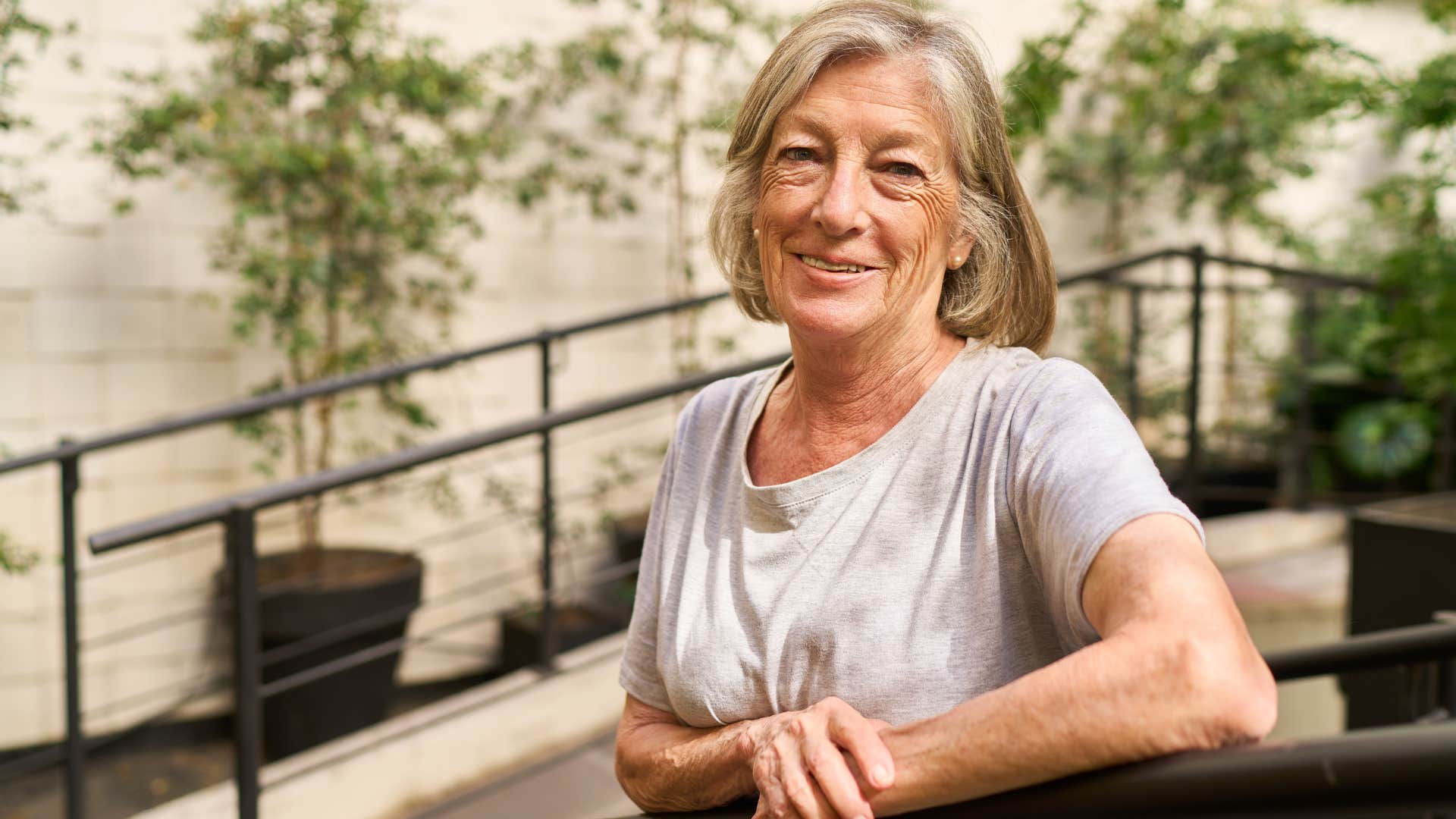People Who Get Quieter As They Age Usually Learned These 11 Hard Truths First
Life is full of wisdom and experience.
 fizkes | Shutterstock
fizkes | Shutterstock While many people do get more confident and self-assured with age, they also simultaneously get quieter and more intentional with their social interactions. While our society often associates loudness and extroversion with confidence, the truth is that having the emotional intelligence to regulate emotions, actively listen to others, and cultivate a strong sense of internal self is really the true measure of confidence.
Of course, this internal power doesn’t always come intrinsically rooted in people, but those who get quieter as they age usually learned certain hard truths first that allowed them to tap into that intentional introversion. Now, they’re careful about protecting their peace, setting boundaries, and investing energy into people who deserve it.
People who get quieter as they age usually learned these 11 hard truths first
1. Most people only listen to respond
 PeopleImages | Shutterstock
PeopleImages | Shutterstock
According to a study from the International Journal of Listening, people who actively listen to others often display a kind of responsiveness in conversation that allows other people to feel heard. It’s a selfless act when done correctly, but for the most part, people are listening not with the intention of understanding others, but to wait for their chance to speak.
People who get quieter as they age, waiting to indulge in healthy conversations with others who are truly listening, may save their energy for people who are willing to appreciate their silence. They reciprocate positive feelings and intentions with their conversation for people willing to do the same.
2. Not everyone has good interests at heart
 Krakenimages.com | Shutterstock
Krakenimages.com | Shutterstock
When they ask “How are you?” or make an effort to get to know you, not everyone has your best interests at heart. In fact, trying to get to know you, being open-minded, and even offering shared experiences and vulnerabilities can all be a ploy to eventually overstep boundaries. People who get quieter as they age and stop sharing so much of their lives with others usually learn these hard truths first.
Like counselor Jamie Cannon suggests, manipulative people also tend to be the most receptive — they’re characterized as the “dark side” to emotional intelligence because of their awareness and social intuition. But if someone notices you’re insecure immediately or tries to pull you into a conversation, it’s not always because they’re being compassionate and selfless.
3. You can’t change people
 sebra | Shutterstock
sebra | Shutterstock
The idea that people “never change” is often a fallacy, but being unable to change someone who doesn’t want to is completely true. We don’t have the power to make people love us, to usher them into healthier habits, or to change their internal mindset when they don’t want to change.
We find familiarity and comfort in our routines, so if someone is struggling or dealing with insecurity, leaning into their patterns is often the only thing they can protect. Of course, people who get quiet and separate themselves from toxic people more often as they get older understand that they can do nothing but support these people they wish to change.
4. Silence is often more powerful than loudness
 JLco Julia Amaral | Shutterstock
JLco Julia Amaral | Shutterstock
No matter how much we like to equate loudness with confidence, the truth is that quietness is often more powerful. The power to regulate emotions in the moment and make space for people you may not agree with will always be more powerful than trying to overtake conversations with a loud voice and overconfidence.
According to a study from Brain Structure and Function, silence on our own also improves brain functions, boosts mood, and cultivates space for our self-image to grow. So, even when they’re on their own, people who get quieter with age have usually learned to embrace the originally uncomfortable truth of silence.
5. Time heals
 Robert Kneschke | Shutterstock
Robert Kneschke | Shutterstock
Even if we want to immediately feel comfortable in the face of change or loss, the truth is that time often heals our old wounds. Sometimes, we can’t force ourselves to “be okay” in a passing moment or situation, without taking time to reflect, regulate, seek support, and ask for help.
A study from Personality and Social Psychology Bulletin found that people are more likely to forgive others and themselves when they’ve had time to reflect, suggesting that time is healing for internal turmoil and grudges. Of course, it often takes a kind of internal acceptance to appreciate the healing quality of time, which is why many people get quieter as they age and accept this hard truth.
6. Inner peace is more satisfying than ‘fitting in’
 PeopleImages | Shutterstock
PeopleImages | Shutterstock
Many people mistake the important feeling of “belonging” with simply trying to “fit in” with others. When you truly belong somewhere, there’s no need to perform — you’re accepted simply for who you are. However, trying to “fit in” suggests changing yourself to fit a certain mold and to be most agreeable to people you’re around at any given time.
People who get quieter as they age and are more intentional with sharing their authenticity with others have to learn the hard truth of differentiating between the two. Now, they care about investing in their authentic communities and finding belonging in important ways, rather than shifting their personality to be approachable and acceptable to other people.
7. Not everyone deserves to be in your life
 Rawpixel.com | Shutterstock
Rawpixel.com | Shutterstock
Even if you’ve been friends for a decade or spent your life growing up with siblings, a hard truth that many quiet people understand more as they age is that it’s possible to drift apart from even your closest friends. Not everyone will be in your life and, more importantly, not everyone deserves to be.
If someone’s actively disrespecting you all the time, ignoring your repeatedly set boundaries, and making you feel worse after every moment of “quality” time, chances are they’re not worthy of taking up a place in your life.
8. Blood family isn’t always forever
 PeopleImages | Shutterstock
PeopleImages | Shutterstock
Especially for people who don’t feel accepted by their biological families growing up and in adulthood, it’s not surprising that “chosen family” often resonates with words like joy, love, trust, and understanding, like a study from Healthcare explains. Compared to biological family connotations — fear, danger, insecurity — these chosen family situations provide safety.
People who get quieter as they age usually learned these hard truths first — that “chosen family” has the power to replace biological family members, especially if they’re not open to accepting and understanding people.
9. Being misunderstood is inevitable
 SynthEx | Shutterstock
SynthEx | Shutterstock
Being misunderstood constantly often spikes levels of stress and harms a person’s self-image, according to a study from the Journal of Social and Personal Relationships. While you can set boundaries and craft an authentic community to rely on for feelings of safety and understanding, being misunderstood is inevitable.
People who get quieter with age and protect their energy around others who are bound to misunderstand them — or to do it on purpose — often learn this hard truth first. They know that it’s impossible to be understood and liked by everyone in the world, and that’s okay.
10. You lose a lot of people when you choose yourself
 PeopleImages | Shutterstock
PeopleImages | Shutterstock
When you start sharing your accomplishments, living your best life, and truly adopting an authentic identity, not everyone will be in your corner. In fact, the friends who are subtly wishing the worst for you and coping unhealthily with their own insecurity may quickly start to voice their distaste and minimize your accomplishments to self-soothe.
While the signs of a fake friend can often be subtle at first, people who get quieter and more introverted as they get older have had their fair share of learning. They’ve had to walk away from people, drift apart from fake friends, and recognize that when you choose yourself and your own success, not everyone will be there to celebrate it.
11. You can always protect your peace
 Stokkete | Shutterstock
Stokkete | Shutterstock
Even though many people today have fallen into an “I don’t anyone anything” mindset that sabotages their relationships with others, the option to create distance, set a boundary, or protect your peace is always available. People who get quieter as they age have learned this hard truth and are now careful about how they invest in and how they fill their time.
Of course, these behaviors often take a kind of self-esteem that’s only present with wisdom and experience. So, it’s not surprising that aging often gives people the tools to stick up for themselves.
Zayda Slabbekoorn is a senior editorial strategist with a bachelor’s degree in social relations & policy and gender studies who focuses on psychology, relationships, self-help, and human interest stories.

